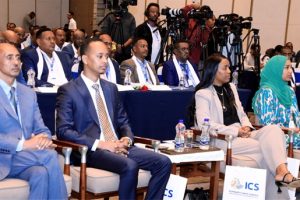
ADDIS ABABA- The efforts to promote circular economy would increase country’s feasibility in international stage in terms of investment and market destination, so said Director General Milkesa Jagema.
Ethiopian Manufacturing Industry Development Institute Director General Milkesa Jagama made the above remark during the launching workshop held under the theme: ‘Promotion of Circular Economy in Textile and Garment Sector through Sustainable Management of Chemicals and Waste in Ethiopia.’
He noted that the textile and garment industry is one of government priority sectors which is rapidly developing industrial sector.
Despite its labor intensive nature which would contribute to reducing unemployment rate and boost nation’s economy, it is considered as one of the polluting sectors since it consumes high amount of energy, dye staff and chemicals, as to him.
To curb this, a lot of mitigation ways have been devised and implemented globally. Recently, the circular economy draws the attention of scholars, environmental activists and governments, he said.
“The objective of this project is lined up with the new Ethiopian Manufacturing Industry Policy as it explicitly stated the need to follow circular economy approach for sustainable and inclusive growth of the sector.”
Circular economy is a new way of creating value and prosperity to state and economy. It works by extending product life span, through improved design, relocating waste from the end of supply chain to the beginning.
In circular economy, products are designed for durability, reuse and recycle ability. Materials for new products come from old products. Thus, governments are encouraging circular economy and make it mandatory to adopt it, he added.
The Institute Deputy Director General Seleshi Lemma stated that the project of circular economy in Textile and Garment Sector would have significant contribution in complying with environment standards and become competitive in domestic and international market place.
He stated that significant numbers of domestic and international investors have entered in to the business where encouraging results have been registered in terms of investment flow, production, job creation, and export and import substitution.
However, climate change and environmental pressure are changing demand patterns and the ways in which global businesses operates.
Given its large contribution to the global carbon emission and future environmental concerns, the sector has seen strong consumer and regulatory interest.
“The growing business and buyers demand for sustainable materials in the future will include circular solution. New materials, technology for recycling of fabrics, fabrics waste and used garment have yet to be deployed at significant scale but are area of concern”
Highlighting the encouraging efforts put to comply with sustainability, he indicated that the waste produced in garment factories is already being recycled and the zero liquid discharge technology that was introduced in different industrial parks and outside is practical efforts that are worth mentioning of circularity.
African Circular Development Network (ACEAN)Regional Coordinator for East Africa within foundation ,Bezawit Eshetu on her part noted that the project would be instrumental in enhancing environmental sustainability within the sector, as well as improving resource efficiency.
Reducing waste generation, strengthening technical capacity and expertise in sustainable practices and increasing adoption of circular economy principles, which leads to economic growth and job creation, is the major benefits of the project.
The project is funded by Global Environment Facility (GEF) and implemented by UNIDO, Textile and Garment Industry Research and Development Centre (TGIRDC) where 10 factories in Ethiopia are beneficiaries, it was learned.
BY BETELHEM BEDLU
THE ETHIOPIAN HERALD FRIDAY 19 APRIL 2024





